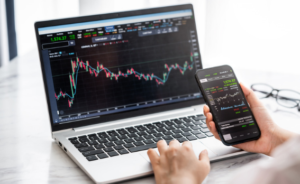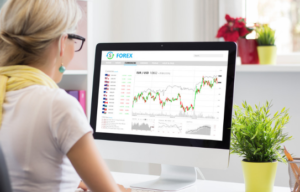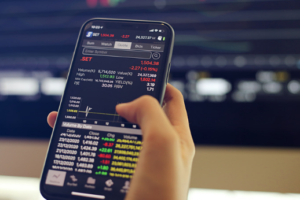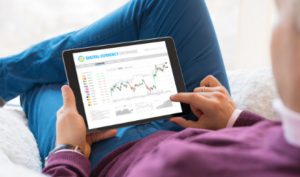This work has examined the important factors to consider while choosing an online trading platform in the UK today. A list of the most popular online trading platforms in the UK has been provided to make it easy for the investor to make his choice.
Introduction
Online trading has become one of the easiest means of making money in the UK today. Hence we find many UK citizens and residents eager to learn how to join the smart investors in trading and make huge profits from online trading. For this set of people, this work is a good guide to teach all you need to know about online trading in the UK.
Not all online trading platforms existing today in the UK are recommendable for the beginners. Hence, this work will show you the best online trading platforms to choose from to make trading easy for you. For those who do not know what to trade online and are just curious to learn and begin trading too.
This work will serve as an introduction to online trading platforms in the UK. We have further worked hard to provide the beginner with an extensive list of all the financial instruments that could be traded online today.
What is an Online Trading Platform?

An online trading platform is an electronic platform that links investors together; making it possible for buying and selling different securities. It is usually a software application built on a strong network, which provides uninterrupted services to users across the region. The online trading platforms usually mimic the market prices of various tradable assets and offer them to its users across the region to place their orders.
Often buying and selling are executed instantly on an online trading platform. Trading with an online trading platform is not entirely free as the owners charge a little maintenance fee called spreads for using their platforms. Only liquid assets are traded on an online trading platform. This enables investors to make profits through intelligent predictions of future market prices of the assets offered.
Types of Online Trading Platforms

There are two main types of the online trading platform known today. They are: Brokers and exchanges.
Brokers
Brokers are online trading platforms where traders speculate on the future prices of various assets against their invested capital. Generally, brokers are intermediary financial service providers; linking investors to the exchange market for buying and selling different financial instruments and assets listed on the exchange market.
Often trading with a broker does not offer the investor a legal ownership over the assets traded. Rather, it allows them to participate in providing liquidity for the assets; which makes buying and selling possible. The fact that there is no legal ownership of the assets purchased does not mean there are no claims to the underlying assets.
The important emphasis here: is that the investor enters into a contract with the trading brokers to speculate on the future prices of the assets purchased and make profits from the price volatility. Virtually all assets traded on the brokerage platform are offered as CFD trading.
Exchange
An exchange is a financial service provider that allows traders to convert their assets into fiat currencies or swap them into a new asset with the same worth. Often, there is e legal ownership of assets purchased through an exchange. This means they are transferrable from the exchange to a new platform.
The only limitation to this ownership is when the investor purchases these assets as CFDs. The term CFD is the modus operandi of brokers which we have discussed earlier. It involves a contract to speculate on the market volatility and make profits without owning the underlying asset.
What is the difference between a broker and an exchange?
The major difference between a broker and an exchange rests with the nature of the assets traded on their platforms. Brokers allow investors to trade their desired financial instruments as CFDs. This means there is no legal ownership of the assets traded using a broker.
This is very much different when it comes to trading with an exchange. An exchange provides a spot trading platform which offers traders a legal ownership of the assets purchased – allowing them to transfer the same from one trading platform to another.
Similarities between an exchange and a broker
- Both are online trading platforms.
- They allow traders to speculate on the future prices of the assets purchased and make profits from the price volatility.
- Both charge fees for using their platforms.
- They are usually registered and regulated (The only exception here is the decentralized exchanges).
- They allow traders to hold their assets for long term on their platforms.
- There is no limit on the number of assets one can purchase from their platforms.
- They provide multiple financial instruments for the trader to make his choice.
- They mimic the real market prices of the assets and present them to the trader at the nearest unit after the spreads have been added.
A short guide on how to choose a UK online trading platform
Choosing an online trading platform in the UK for beginners is usually not an easy task. This is because there exists many online trading platforms operating in the UK today throwing one into confusion on which to select from the list.
To make it easy for beginners to choose their desired online trading platforms in the UK for efficient trading, we have provided a comprehensive guide on how to choose an online trading platform in the UK below:
Decide what to trade

The first step in choosing an online trading platform is to decide what to trade. Knowing what one wishes to trade makes it easy to identify the platform where it is offered for trading. In this case, one proceeds by asking the reflexive question: Am I going to trade stocks and Cryptocurrencies or Forex. The answer to this question will help the trader know which platform to pick between a broker and an exchange.
Choose how to trade
Another important question to ask after one has decided on what to trade online, is how to trade it. Here, the trader is expected to ask himself the reflexive question: Do I wish to trade this asset as CFD or to own it for a long term best investment in the hope of selling when the price rises in the future. The answer to this question makes it easy for the trader to select which online trading platform to choose from the list between a broker and an exchange.
Online Presence in the UK
Before deciding on which exchange or broker to trade with, the traders must verify that the chosen broker or exchange has a strong online presence in the UK and offers services to UK residents.
License
Not all brokers and exchanges are permitted to function in the UK today. Hence, the trader must verify that the chosen online trading platform has a license to function and render services to UK citizens and other residents.
Advantages of using an online trading platform

- Flexibility: Online trading offers maximum flexibility for buying and selling different assets irrespective of one’s location and time. There are no limitations placed on the number of assets to be purchased on the online trading platforms too.
- Portability: A major advantage of online trading is its portability. Thus, all the assets purchased are virtual and stored on one’s device. Traders do not need to carry them along with them everywhere they go.
- Unlimited Trading: There are no limit on the trading hours using an exchange. The only limitation comes during the weekends for traders using a broker.
- Low Capital Requirements: Online trading does not require huge capital to get started. Often one can begin trading with as little as $1- $10 depending on the minimum amount placed by the platform.
- An alternative source of income: Trading online has become an alternative source of income for many residents in the UK today. Salary earners often invested a small portion of their earnings in the hope of making profits.
- Diversifying Investments: Online trading offers investors an opportunity to diversify their portfolios. Thus one can invest in stocks, crypto and commodities at the same time.
- Exposure to the financial market: The various online trading platforms existing today in the UK assist traders in gaining wider exposure to the financial market through the educational contents made available on their platforms. Some brokers often organized free online trading for their active users.
- Leverage: Most online trading platforms provide leverage for trading which helps traders to maximize their profits.
Disadvantages of using an online trading platform
- Risky: There is no guarantee for profits on the assets traded online. This makes online trading a very risky endeavor. The trader’s capital is exposed to loss and none can be held responsible.
- Commissions are charged: Very often brokers and exchanges charge some commissions in the form of spread for using their platforms. This reduces the trader’s profits and increases his loss.
- Causes tensions and anxiety: Assets traded online are largely speculative. This causes a lot of tension for the investor who must guess rightly to make profits.
- Exposes one to scammers: It is often not so easy to escape online scammers who plagiarize most of the popular online trading platforms to scam investors. Many traders have fallen prey to the menace of fraudsters masquerading as real trading platforms.
Most popular online Trading Platform in UK
- eToro
- Plus500
- com
- Vantage Markets
- AJ Bell Youinvest
- XTB
- City Index
- Skilling
- Degiro
- Investengine
- Stake
Factors to consider while choosing an Online Trading Platform in the UK
- Regulation: The only recommended broker or exchange for online trading are those registered with the regulatory bodies in the UK such as: the Prudential Regulation Authority (PRA), the Financial Conduct Authority (FCA), and Her Majesty’s Revenue & Customs (HMRC).
- Trading Fees: An important factor to consider while choosing an online trading platform is the commission they charge for using their platforms. Only brokers and exchanges with very low fees below 1% are recommended for online trading in the UK.
- Customer support services: It is expected that a good online trading platform in the UK should have an excellent customer service unit to attend to the issues and complaints from traders using their platforms.
- Accessibility: A good online trading platform should be readily accessible 24 hours every day, making it possible for traders to place their orders and access their capitals.
- Users Review: The general public opinion about a particular online trading platform is very important in choosing a platform for online trading. Such platforms with high records of failed transactions and dissatisfaction from users are highly discouraged for trading.
- Range of Assets offered: Often the number of financial instruments provided for trading by an online trading platform determines the number of traders attracted to them. Good online trading platforms are to provide a wide range of securities for the trader to select from.
What are the assets offered today by the online trading platforms in the UK?
There are a whole lot of assets offered to investors for buying and selling at the different online trading platforms existing in the UK today. We have discussed some of these assets below:
- Cryptocurrency: A wide range of crypto assets such as Bitcoin, Ethereum, Cardano, Polkadot, Binance Coin, Ripple coin, Dogecoin, Shiba Inu, Litecoin, etc are offered today for trading by the various online trading platforms in the UK. Both brokers and exchanges offer this digital asset for trading in the UK today.
- Forex: This includes Forex trading such as Euro, Pounds, US Dollar, Canadian dollar, Japenese Yen, Swiss Franc, etc. Often the currencies are paired with each other and offered exclusively by the brokers.
- Stocks: Stocks are a company’s shares listed on an exchange. They are usually offered exclusively by brokers. Examples of stocks offered for trading today are Apple, Facebook, Amazon, Twitter, Microsoft, AMC Entertainment Holdings, Airbnb Inc., Adobe Systems Incorporated, eBay Inc. (#EBAY), etc.
- Indices: Indices are combinations of stocks offered as a single security. They are often used to track the performance of a group of stocks. Examples of indices traded today in the UK online trading platforms are: German 30, US 30, S&P 500 Index, US 100 Index (Also known as Nasdaq 100), Volatility S&P 500 Index, Dow Jones Industrial Average, Dollar Index, etc. These financial instruments are offered exclusively by the brokers.
- Commodities: Commodities are physical assets whose real market prices are tracked and traded online. The major commodities traded online today are Gold, Copper, Silver, and Crude oil. These financial instruments are usually offered exclusively by the brokers.
- Exchange-Traded Funds (ETFs): ETFs are a pool of funds traded as securities in the forex market today. They are used to track the prices of the underlying assets comprising the funds. Examples of ETFs traded online today are Global XMSCI Argentina ETF (#ETF- ARGT), SPDR Dow Jones Industrial Average ETF (#ETF DIA), iShares MSCI EAFE Index ETF (#ETF-EFA), Xtrackers Harvest CSI 300 China A-Shares (#ETF – ASHR), iShares MSCI Peru ETF (#ETF – EPU), etc.
Author Profile

- Guest Blogger & Outreach Expert - Interested in Writing Blogs, Articles in Business Niche | News Journalist By Profession in the United Kingdom
Latest entries
 BusinessJuly 1, 2025Wills for Business Owners: Safeguarding Your Enterprise and Legacy
BusinessJuly 1, 2025Wills for Business Owners: Safeguarding Your Enterprise and Legacy Business TipsJune 6, 2025Confidence That Connects the Message
Business TipsJune 6, 2025Confidence That Connects the Message GamingMay 9, 2025Why AI Personalization Is Key for the Next Generation of Betting Platforms?
GamingMay 9, 2025Why AI Personalization Is Key for the Next Generation of Betting Platforms? Business StrategiesMay 1, 2025Key Business Development Strategies for Fostering Sustainable Growth
Business StrategiesMay 1, 2025Key Business Development Strategies for Fostering Sustainable Growth





